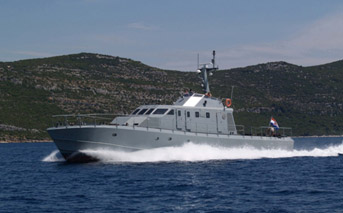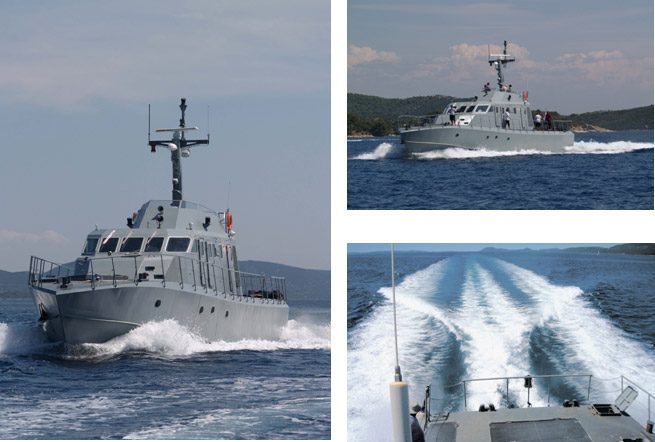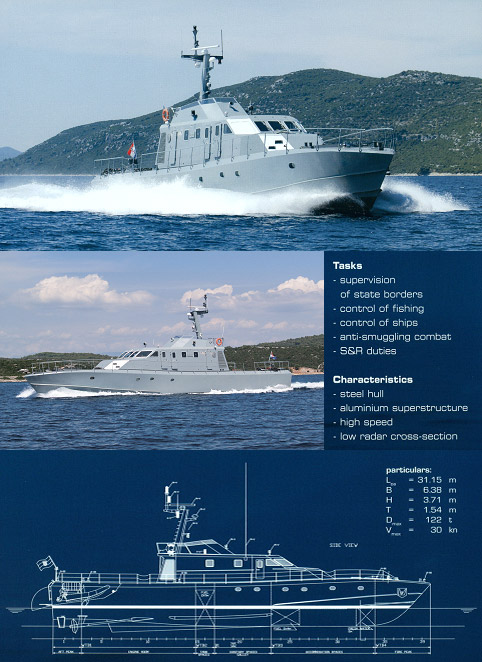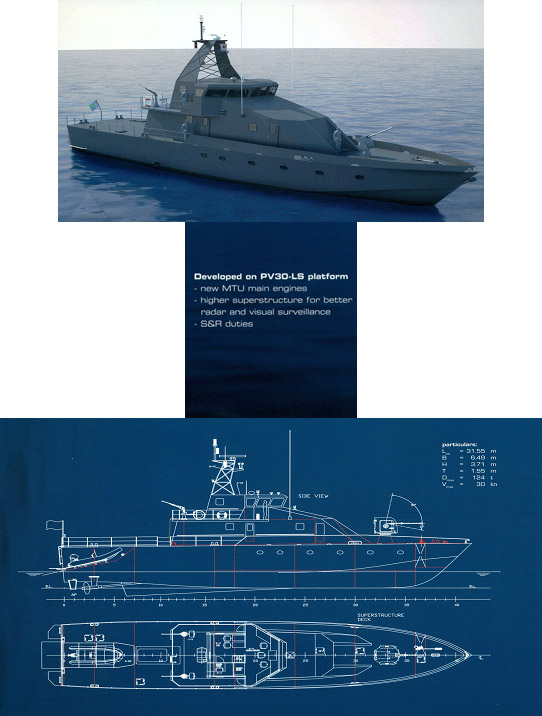PV30-LS Patrol Vessel (Low Silhouette)
The fast patrol vessel PV30-LS was designed as an all weather twin-screw vessel, with an optimum hull form for service conditions within a 20 nm zone of national water areas. The vessel’s equipment have been selected for the ambient and climatic working conditions of 50°C air temperature and 80% humidity, as well as seawater temperature of 33°C. The vessel is primarily designated for the control of state frontiers and territorial seas, for monitoring, pursuing and control of ships, as well as for various rescue duties.
The vessel’s hull is of a modern V-form, with round bilge aft and middle, which enables the vessel to maintan its speed and perform patrol operations under unfavourable weather conditions without restriction up to Sea state 5, according to WMO classification. As for the all weather vessel special attention was paid to the design of foreship to avoid pitching, slamming and green water over the bow. Therefore the foreship height is larger to obtain sufficient surface of the deck in the sharply designed foreship frames. The deep central keel as well as bilge keels and spray rails are fitted and experimentally tested in the basin to improve the seakeeping abilities of the vessel.
The vessel was designed as a low signature one, which is essential in the course of anti-smuggling, anti-piracy and similar duties. By reducing, first of all, the radar cross-section (RCS), the size of the patrol vessel on the opposite radar screen becomes significantly smaller (10-12 m instead of the real size 30 m!), giving in that manner completely wrong information of the arriving patrol vessel. The low radar cross-section of the PV30-LS vessel was achieved by the low silhouette of the vessel itself, obliquely shaped superstructure and minimum equipment on the open deck. In order to reduce the infrared (IR) signature, the main and auxiliary engine exhausts are united into joint branches and thus led slightly above the water level.
Considering tactical and technical requirements, a cautiously chosen and optimum hull form suitable to ensure good maritime characteristics and sea keeping of the vessel was a top design priority. Therefore, comprehensive model hydrodynamics testing was conducted in the well reputed Vienna Ship Model Basin and the vessel showed very goodresults concerning the speed in both calm water and high sea condition, with minimum speed decrease and very low acceleration levels in a harsh sea environment.
Due to the selected twin-screw propulsion system, chosen steering device and the hull form the vessel has good manoeuvrability features. For instance, its turning diameter is 180 m at full speed ahead.
Customer
Libyan NavyTripoli
G.S.P.L.A.J
Main particulars
| LOA | = | 31.15 m |
| LPP | = | 28.20 m |
| B | = | 6.38 m |
| TMAX | = | 1.54 m |
| P | = | 3360 kW |
| VMAX | = | 30 kn |
Material: Steel hull, Aluminium superstructure
Comission
- Complete design of the vessel and systems.
- Detail and production engineering
- Building of six (6) PV30-LS vessels.
- Crew training
| Yard No. | Vessel | YOB |
| 301 | Sidi Bilal | 2006 |
| 302 | Al-Mergeb | 2006 |
| 303 | Jelyana | 2007 |
| 304 | Al-Sadada | 2007 |
| 305 | Merseet | 2008 |
| 306 | Tagreft | 2008 |
Customer benefits
- Design customized to Customer's special requirements
- Transfer of technology
- Extensive education during building and crew training
- Guarantee engineers provided
- Excellent cost vs. benefit ratio
- State of the art engineering and equipment
Special features
- Stealth features incorporated in hull and superstructure design- Measured smaller radar reflection
- Full 3D model of entire vessel
- RIB platform incorporated inside hull; RIB launched via stern ramp
- Hull form optimized both for resistance and seakeeping
|
LOA /B/H
|
31,30 / 6,38 / 3,70m |
|
Displacement
|
116 t
|
|
Speed
|
25 kn continous, 30,5 kn max. |
|
Range&Autonomy
|
1000 NM
|
|
Complement
|
14
|





|
NEWSLETTER
|
| Join the GlobalSecurity.org mailing list |
|
|
|

